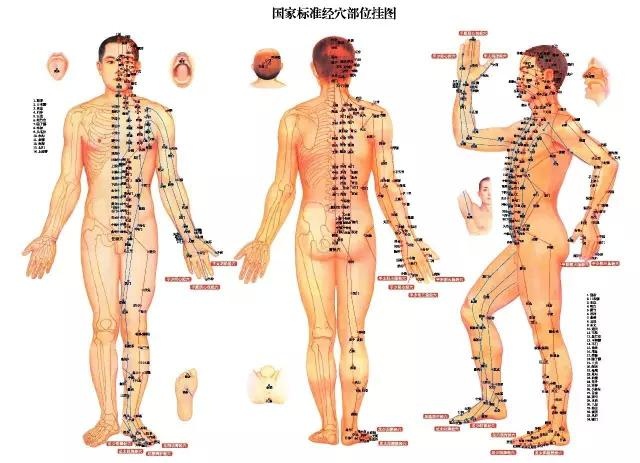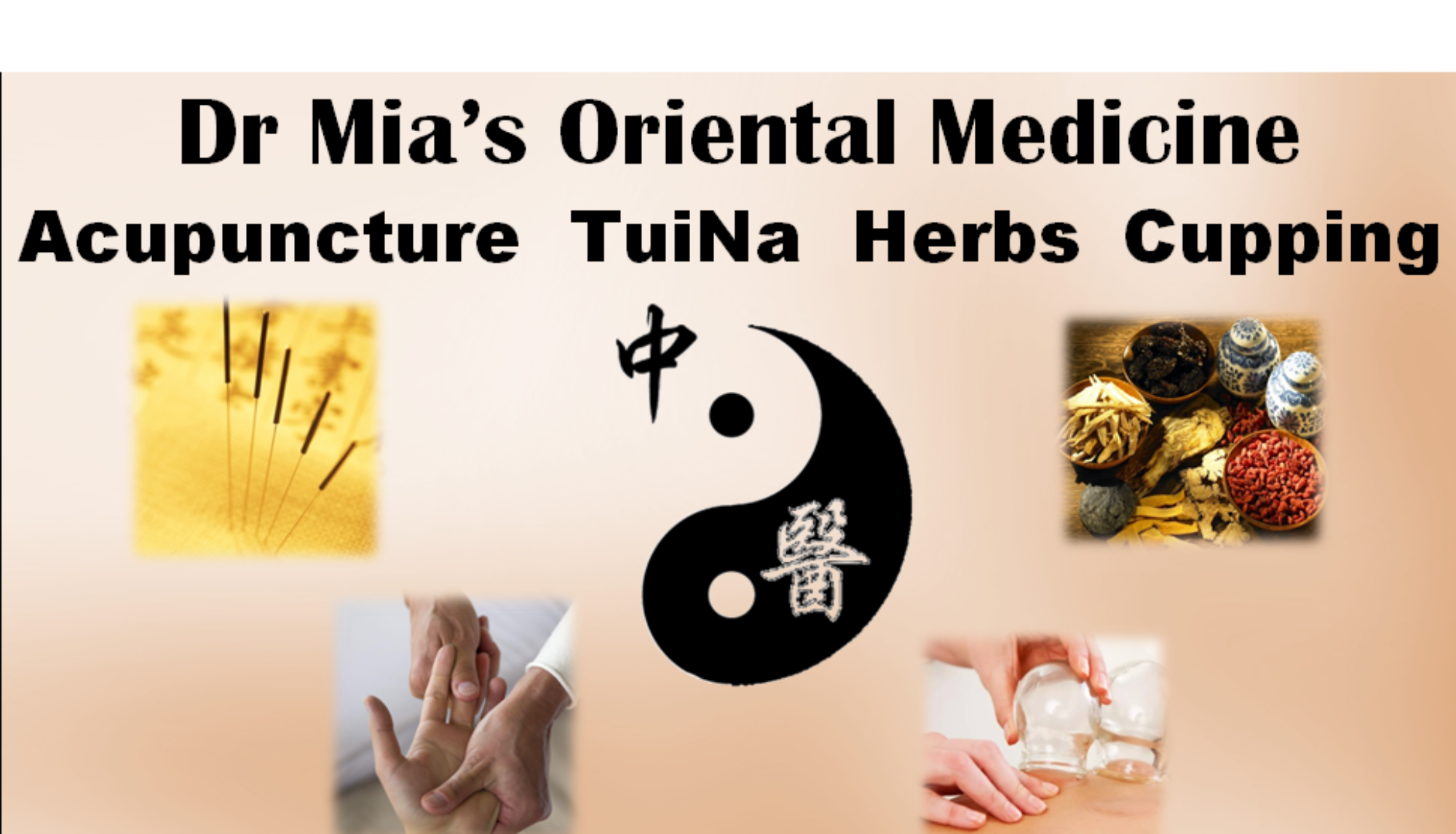Meridians Theory
In TCM meridian theory, each of the meridian is connected to a specific organ system or a channel function system. The 12 Primary Meridians are lung and large intestine, heart and small Intestine, spleen and stomach, liver and gallbladder, kidney and bladder, pericardium and triple burners which are Yin-Yang paring and co-responding. Besides the 12 Primary Meridians, there are 8 extraordinary Meridian channels running through our body. The 8 extraordinary Meridians connect and complete, balance and communicate to the 12 Ordinary Meridians, making the whole body system harmony and healthy. Meridians are like rivers inside the body. Wherever a river flows, it carries water that provide the nourishment and the sustenances for life on the planet. Similarly, Meridians are the rivers carrying Qi the energy flows, Jing and Ye the body fluids and blood to penetrate inside of us as an invisible current, energizing, nourishing and supporting every cell, tissue, muscle, organ and gland.

The Philosophical and Clinical Depths of Meridian Theory in Traditional Chinese Medicine
1. The Ontological Foundations of Meridian Theory
The meridian system represents one of TCM’s most profound conceptual achievements – a sophisticated mapping of the dynamic interface between material anatomy and energetic physiology. These pathways exist not merely as physical conduits but as living manifestations of qi’s intelligent movement through the organism. The ancient physicians discerned twelve primary meridians not through dissection, but through centuries of clinical observation, meditation, and what might be called “energetic cartography” – the gradual revelation of the body’s subtle energy topography.
What makes the meridian system remarkable is its dual nature as both:
– A descriptive framework that explains physiological relationships
– A prescriptive guide for therapeutic intervention
The meridians form an intricate web connecting the exterior with the interior, the limbs with the trunk, and the physical body with consciousness itself. This explains why a point on the lower leg (ST36) can affect digestive function, or why a wrist point (HT7) can calm mental agitation.
2. The Twelve Meridians as Embodied Cosmology
Each primary meridian embodies a unique aspect of human physiology that mirrors cosmic principles:
The Lung Meridian (Taiyin)
– Represents the interface between inner and outer worlds
– Governs not just respiration but the rhythmic pulsation of life itself
– In imbalance, manifests as either excessive attachment (accumulation) or inability to receive (deficiency)
The Liver Meridian (Jueyin)
– The general of the body’s qi forces
– Maintains the smooth flow of both physical substances and emotional energies
– Its dysfunction underlies both physical spasms and emotional rigidity
The Bladder Meridian (Taiyang)
– The most extensive yang channel
– Functions as the body’s informational highway with back-shu points connecting to all organs
– In qigong traditions, considered a major pathway for wei qi (defensive energy)
3. The Clinical Art of Meridian Diagnosis
True mastery of meridian theory requires developing multiple diagnostic lenses:
Palpatory Sensitivity
The ability to detect:
– Temperature variations along channels
– Areas of qi congestion or depletion
– The distinctive quality of pulse positions reflecting meridian states
Symptom Pattern Recognition
Understanding that:
– Temporal patterns (e.g., 3-5am waking) relate to organ-meridian cycles
– Pain radiation pathways reveal meridian involvement
– Emotional states correlate with specific meridian imbalances
Energetic Assessment
Discerning between:
– Channel-level vs. organ-level disorders
– Structural vs. functional meridian disturbances
– Local vs. systemic manifestations of meridian dysfunction
4. Advanced Therapeutic Strategies
Beyond basic point prescriptions, profound meridian therapy involves:
Temporal Considerations
– Treating meridians during their diurnal energetic peaks
– Seasonal adjustments to treatment protocols
– Lunar cycle influences on qi flow
Depth of Intervention
– Superficial needling for wei-level disorders
– Deeper needling for ying-level conditions
– Combined techniques for complex multi-meridian pathologies
Energetic Manipulation
– Tonifying vs. sedating techniques
– Directional needle manipulation
– Integration of intention and practitioner qi
5. The Meridian-Mind Connection
Modern research is beginning to validate what ancient texts described – that meridians form a psychosomatic network:
– Emotional trauma creates predictable meridian constrictions
– Chronic thought patterns leave imprints on related channels
– Spiritual development can enhance meridian conductivity
This explains why:
– The Heart meridian holds emotional memories
– The Liver meridian stores repressed anger
– The Kidney meridian contains constitutional fears
6. Contemporary Relevance and Future Directions
Meridian theory continues to evolve through:
– Bioelectric mapping research
– Fascial system correlations
– Quantum biology interpretations
– Psychoneuroimmunological models
The most exciting developments involve:
– Personalized meridian modulation using AI pattern recognition
– Quantum meridian diagnostics
– Energy medicine applications in space medicine
Conclusion: Meridian Theory as Living Wisdom
The meridian system represents a grand unifying theory of life – one that integrates physical, emotional, and spiritual dimensions of health. Its depth becomes apparent only through years of clinical practice and personal cultivation. As both a medical framework and a philosophical system, it continues to offer profound insights into human health that modern science is only beginning to appreciate.
For practitioners, the meridians are not just treatment pathways but teachers – revealing through their patterns and responses the deeper intelligence of the living organism. True mastery requires developing what the classics called “ming mu” – the bright eyes that see beyond surface appearances to perceive the subtle movements of qi.
Pathological symptoms of the 12 Primary Meridians and 8 Extraordinary Vessels
The meridian pathologies are used to help differentiate pathological conditions manifesting in the area of the meridian pahway their related Zang Fu organs. Pathology in the zang Fu organs can be reflected onto the meridian, or a meridian pathology can affect the Zang Fu organs.
Pathological symptoms of the Lung Meridian: Cough, asthma, sneezing, stuffy Nose, hemoptynis, congested and sore throat, sensation of fullness in th chest, Pain in supraclavicular fossa, shoulder, back and anterior border of medial aspect of the arm Pathway
Pathological symptoms of the Large intestine Meridian: Diarrhea, dysentery, epistaxis, watery nasal discharge, toothache, congested and sore throat, abdominal pain, Borborygmus, Pain in neck, anterior part ofthe sboulders and the anterior border of tho extensors of the upper limbs pathway
Pathological symptoms of the Stomach Meridian: Borborygmus, abdominal distension, edema, epigastric pain, vomiting, feeling of hunger, deviation of mouth and eyes, congested and sore throat, fover, mental disturbances, Chest pain, pain in the abdominal tegion and the lateral aspect of the lower limbs
Pathological symptoms of the Spleen Meridian: Abdominal distension, epigastric pain, vomiting, belching, loose stools, fatigue, jaundice, stiffneas and pain at Spleen the root of the tongue swelling and a feeling of cold in the area medial to the knee
Pathological symptoms of the Heart Meridian: Palpitations, cardialgia, hypochondriac pain, thirst, insomnia, night sweats, dry throat, Pain in the medial aspect of the upper arm and a heat sensation in the palms
Pathological symptoms of the Small Intestine Meridian: Frequent urination, distension and pain in the lower abdominal region. sore throat, swollen cheek, deafness. yellow sclera in the eye Pain along the posterior bander of the lateral aspect of the shoulder and arm
Pathological symptoms of the Urinary Bladder Meridian: Enuresis, retention of urine, occipital beadache, mental disturbance, rhinnitis, epistaxis, nasal obstruction, lacrimation when exposed to the wind Pain in nape ofthe neck, upper and lower part of back, buttocks and the posterior aspect of lower limbs
Pathological symptoms of the Kidney Meridian: Frequent urination, impotence, enuresis irregular menstruation, asthma, hemoptysis, dry tongue, edema, congested and sore throat, Pain along the spinal column, low back pain, medial apect of the highs, weakness in the lower limbs especially in the knees and a hot sensation in the soles of the feet
Pathological symptoms of the Pericardium Meridian: palpitations, cardialgia, mental restlessness, flushed face, mental disturbance stifling feeling in chest, swelling foeling in axilla, spasms in upper limbs, sensation of heat in palms of hands
Pathological symptoms of the Triple Burners Meridian: Edema, enuresis, abdominal distension, dysura, tinnitus, eongested and a sore ihroat, swelling in the cheek, pain in the retroauricular area, shoulder and the lateral aspect of the arm and elbow
Pathological symptoms of the Gallbladder Meridian: Blurry vision, bitter taste in the mouth Pain in the outer canthus, jaw, supraclavicular fossa, axilla, along the lateral aspect of the chest, hypochondriac region, thigh and the lower limbs
Pathological symptoms of the Liver Meridian: vertex head ache, hernia, dry throat, hiccup, enutesis, dysuria, mental disturbances Pain in low back, fullness in chest, pain in lower abdominal region
Pathological symptoms of the Conception Vessel: irregular menstruation, dysmenorrhea, leukorrhea, seven types of hernia, infertility, vaginal pain, nocturnal emission, enuresis, difficult urination, and pain along the channel distribution.
Pathological symptoms of the Governing Vessel: stiffness and pain along the spiral column, opisthotonos, manic-depression, disorders due to Wind such as Wind Stroke, epilepsy infantile convulsions, shaking, tremors, heavy sensation of the head, dizziness, vertigo, fever, Qi rushing upward, hemorrhoids, enuresis, retention of urine, and pain along the channel distribution.
Pathological symptoms of the Girdling vessel:Abdominal fullness, a sensation at the waist as though sitting in water, pain around the umbilicus, abdomen, waist and lumbar spine, red and white leucorrhoea, irregular menstruation, infertility, insufficient sperm, shan disorder.
Pathological symptoms of the Penetrating vessel: Counterflow qi, abdominal urgency, dyspnoea, gynaecological disorders, atrophy disorder of the leg.
Pathological symptoms of the Yang Motility vessel: Daytime epilepsy, eye diseases, loss of consciousness, aversion to wind, hemiplegia, chronic painful obstruction, rigidity of the body, lumbar pain, contracted sinews, flaccidity of the muscles of the medial leg and tightness of the muscles of the lateral leg.
Pathological symptoms of the Yang Linking vessel: Visual dizziness, dyspnoea, acute and sudden pain and swelling of the lumbar region, chills and fever, dyspnoea with raised shoulders, fever and chills.
Pathological symptoms of the Yin Motility vessel: Night-time epilepsy, eye diseases, chills and fever, painful obstruction of the skin due to damp-heat, hypogastric pain, internal urgency, pain of the genitals, contracted sinews, shan disorder, uterine bleeding, leucorrhoea, flaccidity of the muscles of the lateral leg and tightness of the muscles of the medial leg.
Pathological symptoms of the Yin Linking vessel: Heart pain, pain of the chest, fullness and pain of the lateral costal region, lumbar pain.

